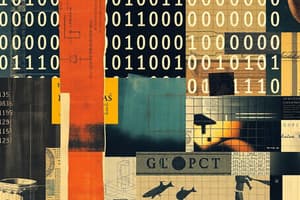Podcast
Questions and Answers
Which programming language is not commonly recognized as a major programming language?
Which programming language is not commonly recognized as a major programming language?
- Fortran (correct)
- Java
- JavaScript
- Python
What is a primary concern regarding the societal impact of computer science?
What is a primary concern regarding the societal impact of computer science?
- Enhancing communication technologies
- Development of entertainment applications
- Increased efficiency in data processing
- Privacy and security issues (correct)
Which of the following is a step that is not part of the systematic approach to problem-solving?
Which of the following is a step that is not part of the systematic approach to problem-solving?
- Identifying possible solutions
- Understanding the problem
- Analyzing and evaluating solutions
- Ignoring potential solutions (correct)
Which of the following is not a common data structure?
Which of the following is not a common data structure?
What type of algorithms specifically focus on organizing data?
What type of algorithms specifically focus on organizing data?
What does computer science primarily study?
What does computer science primarily study?
Which of the following is not considered a part of a computer system?
Which of the following is not considered a part of a computer system?
What is an algorithm?
What is an algorithm?
What is the function of memory in a computer system?
What is the function of memory in a computer system?
Which of the following best describes hardware?
Which of the following best describes hardware?
What characterizes Local Area Networks (LANs)?
What characterizes Local Area Networks (LANs)?
Which component of a computer system is responsible for executing instructions?
Which component of a computer system is responsible for executing instructions?
What aspect of programming does 'control structure' refer to?
What aspect of programming does 'control structure' refer to?
Flashcards
Algorithm
Algorithm
A set of instructions that a computer follows to perform a specific task. Algorithms are essential for creating efficient and effective computer programs.
Repetition (Loop)
Repetition (Loop)
A fundamental programming construct that allows a program to execute a set of instructions repeatedly. They are used to automate repetitive tasks.
Selection (Choice)
Selection (Choice)
A programming construct that provides a way to make decisions based on different conditions. It lets a program choose one path of execution over another.
Problem-Solving
Problem-Solving
Signup and view all the flashcards
Data Structure
Data Structure
Signup and view all the flashcards
What is computer science?
What is computer science?
Signup and view all the flashcards
What is a program?
What is a program?
Signup and view all the flashcards
What is a programming language?
What is a programming language?
Signup and view all the flashcards
What is hardware?
What is hardware?
Signup and view all the flashcards
What is software?
What is software?
Signup and view all the flashcards
What is an algorithm?
What is an algorithm?
Signup and view all the flashcards
What is a LAN?
What is a LAN?
Signup and view all the flashcards
What is a WAN?
What is a WAN?
Signup and view all the flashcards
Study Notes
Introduction to Computer Science
- Computer science is the study of computers and computational processes.
- It involves designing, developing, and applying computational tools and techniques to solve problems.
- Key areas include algorithms, data structures, programming, databases, networks, and artificial intelligence.
History of Computing
- Early computing devices, including the abacus and slide rule, were mechanical tools used for calculations.
- The development of the first electronic digital computers in the mid-20th century marked a significant advancement.
- Key figures and milestones in computer history include Colossus, ENIAC, and the invention of the transistor.
- The development of integrated circuits and microprocessors led to the miniaturization and increased power of computers.
- The evolution of the internet and World Wide Web has revolutionized communication and information access.
Fundamental Concepts
- Data: Represents facts, figures, or symbols.
- Information: Processed data with context and meaning.
- Algorithm: A step-by-step procedure for solving a problem.
- Program: A set of instructions for a computer to execute.
- Programming Language: A formal language used to write programs.
- Hardware: The physical components of a computer system, such as the processor, memory, and storage devices.
- Software: The set of programs and instructions that operate on the hardware to perform tasks.
Computer Systems
- A computer system consists of input devices, output devices, central processing unit (CPU), memory, and storage devices.
- Input devices allow data entry, such as keyboards and mice.
- Output devices display results, such as monitors and printers.
- The CPU is the brain of the computer, executing instructions.
- Memory (RAM) stores data and instructions that the CPU is currently using.
- Storage devices (hard drives, SSDs) store data permanently.
Computer Networks
- A network connects multiple computers and devices together.
- Local Area Networks (LANs) connect computers within a limited area.
- Wide Area Networks (WANs) connect computers over a larger geographic area.
- The internet is a global network connecting millions of computers.
Programming Fundamentals
- Programming involves instructing a device to perform specific tasks.
- Concepts include variables, data types, operators, control structures (if-else, loops), and functions.
- Common programming languages in use include Python, Java, C++, and JavaScript.
- Basic programming constructs for sequential execution, selection (choice), and repetition (loops).
- The importance of problem-solving and logical thinking in programming.
Applications of Computer Science
- Computer science impacts many aspects of modern life through the development of software and applications.
- Examples include communication technologies, entertainment applications, research tools, database management, and information technology systems.
Ethics and Societal Impact
- Computer science has both positive and negative impacts on society.
- Privacy, security, and accessibility are concerns that need to be addressed.
- The role of computer scientists in creating ethical and responsible technology.
- Understanding potential societal impacts of computer technologies.
Problem Solving
- Analytical skills and logical reasoning are crucial for problem-solving.
- Understanding the problem, identifying possible solutions, analyzing and evaluating solutions are key aspects.
- Employing a systematic approach to finding effective solutions.
- Algorithms play a key role in developing a step-by-step approach to overcome challenges.
Data Structures
- The ways data can be organized in a computer.
- Common data structures such as arrays, lists, stacks, and queues.
Algorithms
- Specific procedures for carrying out calculations and operations.
- Example algorithms include search algorithms (linear, binary) and sorting algorithms (bubble, merge).
Studying That Suits You
Use AI to generate personalized quizzes and flashcards to suit your learning preferences.




